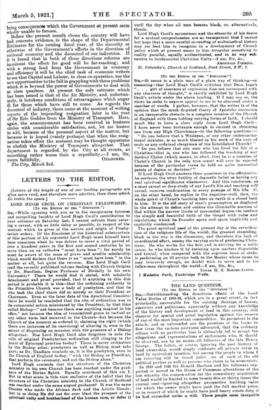[To TEE Eorroa or THE " SFOCTATOR."] 8114—It -seems to
a plain man of a plain way of thinking—or reasoning—that Lord Hugh Cecil's criticism that Dean Inge', " . . . gift of clearness of expression does not correspond with any clearness of thought," is exactly -exhibited by Lord Hugh Cecil's article under the above heading. If I may say so, the views he seeks to express appear to me to be obscured under a smother of words. I gather, however, that the writer is of the opinion that the much disputed theory of Apostolic succession is an insuperable obstacle to a complete reunion of the Church of England with those holding varying forms of faith. I should much like to have a clear reply from Lord Hugh Cecil— I have never been fortunate enough bo succeed in obtaining one from any High Churchman—to the following questions :- " Do you believe that a Wesleyan, or any other undenomina- tional minister, is as much blessed in his work of the cure of souls as any ordained clergyman of the Established Church? "
"Do you believe that any man who has lived the life of a Christian—that is, one who has followed the teaching of our Saviour Christ (which means, in effect, that he is a member of Christ's Church in the only true sense) will ever be rejected because of the particular views he held on quite inessential points of dogma or doctrine?"
If Lord Hugh Cecil answers these questions in the affirmative,
he confesses the utter futility of dogmatic belief as having any real spiritual significance whatsoever. And this conclusion, as a most casual or deep study of our Lord's life and teaching will reveal, receives confirmation in every passage of His life. If, on the other hand, he replies in the negative—well, then, the whole spirit of Christ's teaching here on earth is a closed book to him. It ie the old story of man's presumption as displayed in the attempt to define and confine the illimitable mercies of God within the narrow limits of inessential dogma—to confuse the simple and beautiful faith of the Gospel with rules and regulations, which its Founder again and again implicitly and explicitly condemned.
The great spiritual need of the present day is the revivifica-
tion of the religious life of the world; the greatest stumbling- blook in the way is the dissension, and therefore the lack of co-ordinated effort, among the varying sects of professing Chris- tians. He who works for the first end is etriving for a noble cause; he who hinders it by insisting upon matters disputable and trivial, when compared with the supreme issue at stake, is performing an ill service both to the Master whose cause he may (sincerely enough, no doubt) wish to serve and to his fellow-men throughout the world.—I am, Sir, &c.,
EDGAR H. S. BARNES-AUSTIN.
1 •Madeira Park, Tunbridge Wells.


































 Previous page
Previous page